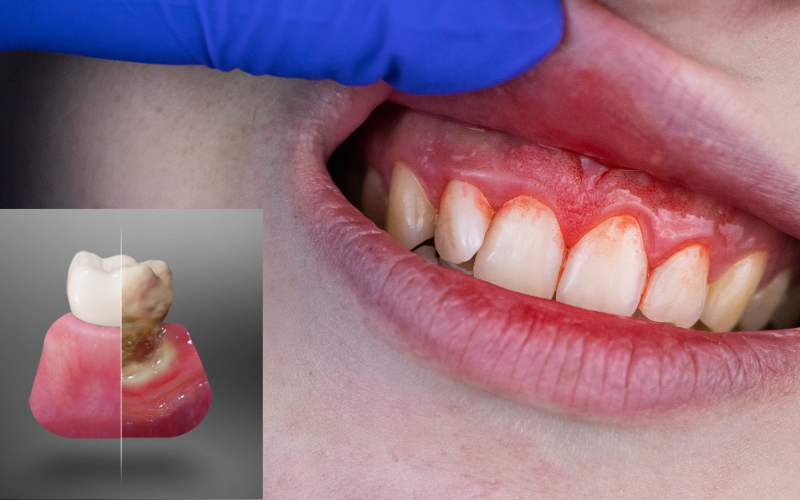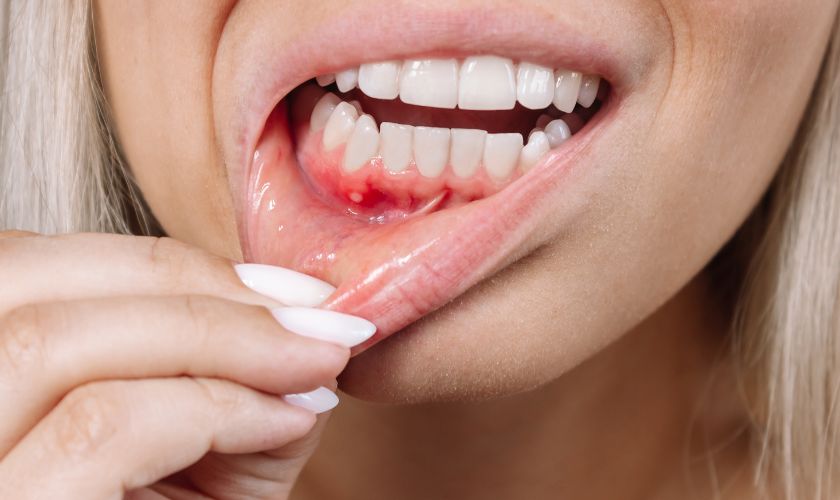(703) 372-5665
How To Avoid Gum Disease With Regular Periodontal Therapy

How To Avoid Gum Disease With Regular Periodontal Therapy
Millions of individuals worldwide suffer from gum disease, commonly referred to as periodontal disease. If ignored, it may result in major oral health problems, including tooth loss. However, regular periodontal therapy can help prevent gum disease and maintain your oral health.
In this blog, we’ll discuss how periodontal therapy works, the types of treatments available, and how it can help you avoid gum disease.
What Is Periodontal Disease?
Plaque contains germs that accumulate on your teeth and cause periodontal disease, which is an inflammation of the gums. Plaque can become tartar if it is not adequately cleared by brushing and flossing. Only a dental professional can remove it properly.
The initial stage of gum disease, gingivitis, can be brought on by the bacteria in plaque and tartar. Gingivitis can develop into periodontitis, a more severe disorder that can harm the gums, bone, and other tooth-supporting tissues if left untreated.
Signs and Symptoms of Gum Disease
To prevent gum disease, it’s important to recognize its early signs. Some common symptoms include:
- Red, swollen, or tender gums
- Bleeding gums, especially when brushing or flossing
- Constant bad breath
- Receding gums or gums pulling away from the teeth
- Loose or shifting teeth
If you face any of these symptoms, it’s crucial to see your dentist or periodontist for an evaluation.
What Exactly Is Periodontal Therapy?
Periodontal therapy refers to a range of treatments designed to prevent, manage, and treat gum disease. It can include both non-surgical and surgical procedures, depending on the severity of the condition. Regular periodontal therapy is essential for maintaining gum health, keeping your teeth and gums maintained, and stopping the advancement of gum disease for life.
How Does Periodontal Therapy Help Prevent Gum Disease?
Regular periodontal therapy plays a vital role in preventing gum disease by:
- Removing plaque and tartar buildup: Professional cleanings eliminate the irremovable tartar and plaque by brushing and flossing alone.
- Reducing gum inflammation: Deep cleaning procedures, like scaling and root planing, eliminate microorganisms from the area behind the gums, reduce inflammation, and promote healing.
- Monitoring gum health: Frequent examinations enable your periodontist or dentist to keep an eye on the condition of your gums and catch any signs of disease early.
- Promoting healthy habits: Your dental care provider can offer advice on proper oral hygiene techniques, including brushing, flossing, and using antimicrobial mouthwash to keep your gums healthy.
Types of Periodontal Therapy
There are several types of periodontal therapy that can help prevent gum disease:
1. Scaling and Root Planing
Plaque and tartar behind the gum line can be eliminated using a thorough cleaning process called scaling and root planing. Scaling is the process of removing accumulation from the teeth, whilst root planing is the process of smoothing the tooth roots to stop germs from growing again. This treatment is often recommended for patients with early-stage gum disease.
2. Gingival and Soft Tissue Grafting
A gingival or soft tissue graft might help restore the gumline and shield your teeth's roots if you have receding gums as a result of gum disease. During this treatment, donor tissue or tissue from another area of your mouth will be used, and it will be attached to the damaged area.
3. Antibiotic Therapy
In some cases, your dentist may recommend the use of antibiotics to treat gum disease. Antibiotic gels, oral antibiotics, or microspheres that are inserted straight into gum pockets to eradicate germs are some examples of this.
4. Laser Therapy
One less invasive gum disease treatment option is laser therapy. It uses focused light to remove infected tissue and bacteria, promoting healing while causing less discomfort than traditional surgical methods.
5. Periodontal Surgery
In situations of gum disease that are advanced, periodontal surgery could be required. This can include procedures like pocket reduction surgery, bone grafts, or tissue regeneration to restore damaged areas and eliminate bacteria.
The Importance of Regular Checkups
It's crucial to maintain good dental hygiene at home to attend regular dental checkups & monitor your gum health. Your dentist or periodontist will be able to identify early indications of gum disease and suggest suitable periodontal therapy to prevent further damage.
How Often Should You Have Periodontal Therapy?
The frequency of periodontal therapy depends on your individual oral health needs. Most patients with a history of gum disease will need to have periodontal maintenance cleanings every 3 to 4 months. During these visits, your dental professional will perform a thorough cleaning, check for signs of disease, and monitor the health of your gums.
Benefits of Regular Periodontal Therapy
Maintaining a consistent schedule of periodontal therapy offers numerous benefits, including:
- Prevention of advanced gum disease: Identifying and treating gum disease early can prevent it from getting worse.
- Reduced risk of tooth loss: By keeping your gums healthy, you can protect the structures that support your teeth, reducing the risk of tooth loss.
- Improved overall health: Researchers have connected gum disease to systemic health problems, including heart disease, diabetes, and respiratory infections. By preventing gum disease, you may also reduce your risk of these conditions.|
- Fresher breath: Regular cleanings help remove the bacteria that cause bad breath, leaving your mouth feeling clean and fresh.
Gum disease poses a serious threat to oral health, and if left untreated, it can lead to major problems. Consistent periodontal treatment is essential for preserving gum health and stopping the advancement of gum disease.
Scheduling routine cleanings, practicing good oral hygiene, and seeking treatment at the first sign of gum disease, will surely protect your smile and overall health. Don’t wait until it’s too late—talk to your dentist about regular periodontal therapy and take control of your gum health today.






